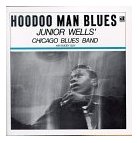Music |
Junior Wells
By
Published: Feb 07, 2022
Category:
Blues
He was making $1.50 a week on a soda truck in West Memphis to earn the money for a harmonica. But it cost $2. The pawnshop owner walked away from the counter for a moment, so he stole it. Got arrested. Appeared before the judge.
“Why did you do it?”
“I had to have that harp.”
“Yes? Can you play it?”
He took the harmonica and let loose.
“Here’s the 50 cents you need,” the judge said. “Case dismissed.”
Amos Wells, Jr., aged 12, was on his way.
By 14, he was in Chicago, sitting in with blues legends and earning the nickname “Junior.” Even as a teen, he had a distinctive style — when you least expected it, his harmonica produced a blast, just as his singing was punctuated by the occasional yelp. And he instinctively knew that the blues was best as raunchy, sexy music, and that it held dark secrets about the midnight politics between men and women. [To buy the CD of "Hoodoo Man Blues" from Amazon, click here. To buy the MP3 download, click here.]
He looked the part of a bluesman. Sharkskin suit, slicked hair, sharp hat, cigarette. One night, at a club, he handed a friend a wad of cash to hold while he played — he couldn’t abide an unsightly bulge in his clothes. Another night, a friend and his wife were threatened by some drunk jerk. Junior jumped off the stage and pointed a pistol at the jerk, as his friends wondered, “Where did he hide that gun in his skintight suit?”
He was a character. In some clubs, when his band started to play, Junior was at the bar, which had been rigged with a remote mike so he could perform without having to leave his drink. On the bandstand, his tools awaited: harps in seven keys. And, always, a bottle of gin.
Hoodoo Man Blues, his first record, and his best, was made in 1965. Buddy Guy — credited, for contractual reasons, as “Friendly Chap” — plays guitar. Jack Myers plays bass, Billy Warren is on drums. Giants, all. If they sound as if they’re in a club, that’s deliberate; this is pure Chicago blues, raw as the liquor served in those joints and, in the slower numbers, smooth as the lines of sharp-dressed men working to seduce foxy women.
I could run down the song list and marvel at the rich variety of music, but the big picture is all that matters: These are the definitive versions of twelve classic songs. Junior’s harp is as assertive as a dog in heat; his voice is slick and knowing. Listen, say, to an overdone song like "Good Morning Little Schoolgirl" — it’s so down and dirty you want to check the lock on your daughter’s window.
When Junior died, at 63, he was laid out in a royal blue suit and wide-brimmed hat. In his coffin: harmonicas in every key and a pint of Tanqueray. Awesome, don’t you think? But not nearly as awesome as “Hoodoo Man Blues,” a recording that has given joy to this listener for four decades now, a recording that belongs in the collection of anyone who claims to love music.


